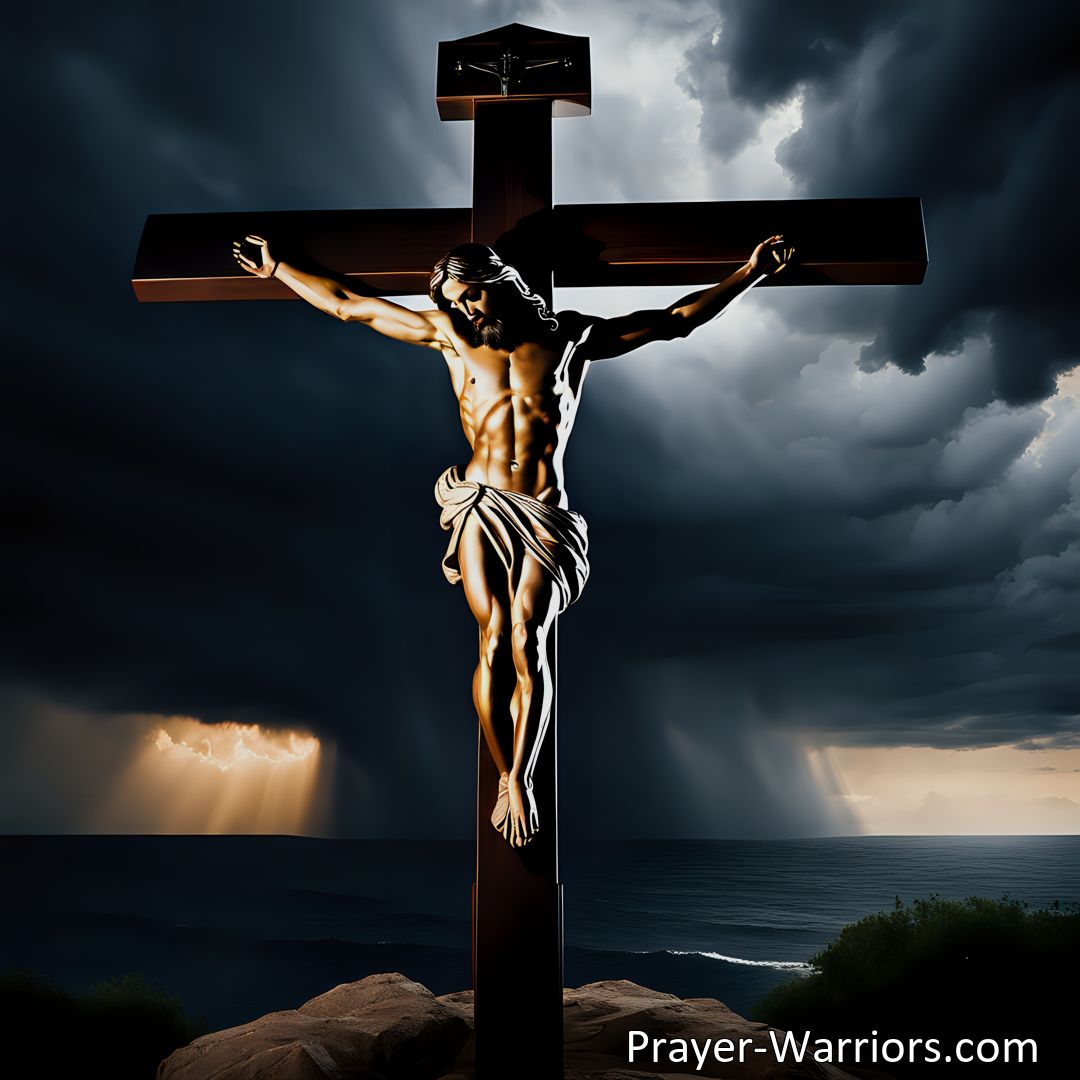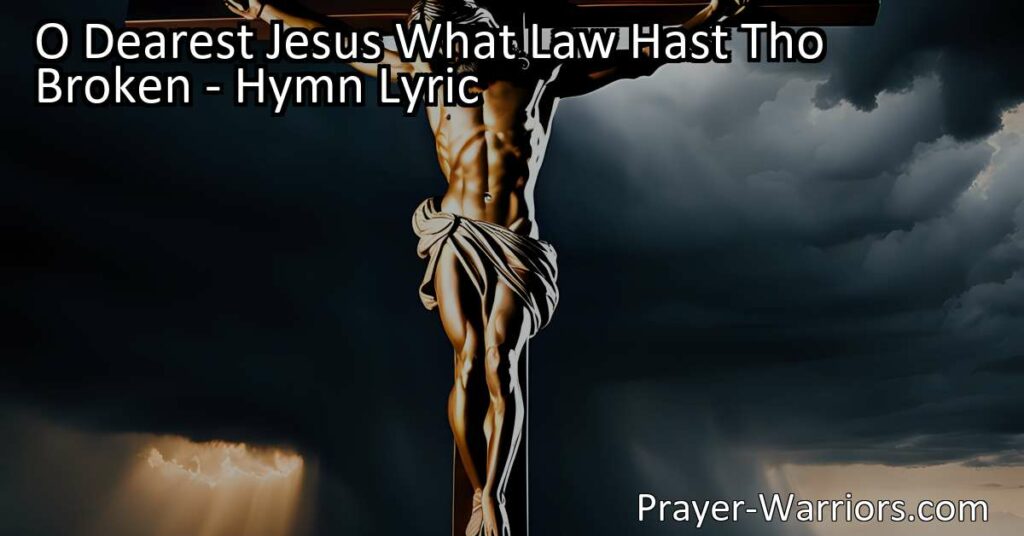O Dearest Jesus What Law Hast Tho Broken – Hymn Lyric
“O Dearest Jesus, What Law Hast Thou Broken: Exploring the Depths of God’s Love and Sacrifice” is a hymn that delves into the profound love and sacrifice of Jesus Christ. It questions the reason behind His severe punishment and highlights His innocence. The hymn acknowledges the human responsibility for His suffering and expresses gratitude for His unimaginable love and mercy.
Table of Contents
O Dearest Jesus What Law Hast Tho Broken – Hymn Lyric
O dearest Jesus, what law hast Thou broken
That such sharp sentence should on Thee be spoken?
Of what great crime hast Thou to make confession,
What dark transgression?
They crown Thy head with thorns, they smite, they scourge Thee;
With cruel mockings to the cross they urge Thee;
They give Thee gall to drink, they still decry Thee;
They crucify Thee.
Whence come these sorrows, whence this mortal anguish?
It is my sins for which Thou, Lord, must languish;
Yea, all the wrath, the woe, Thou dost inherit,
This I do merit.
What punishment so strange is suffered yonder!
The Shepherd dies for sheep that loved to wander;
The Master pays the debt His servants owe Him,
Who would not know Him.
The sinless Son of God must die in sadness;
The sinful child of man may live in gladness;
Man forfeited his life and is acquitted;
God is committed.
There was no spot in me by sin untainted;
Sick with sin’s poison, all my heart had fainted;
My heavy guilt to hell had well-nigh brought me,
Such woe it wrought me.
O wondrous love, whose depth no heart hath sounded,
That brought Thee here, by foes and thieves surrounded!
All worldly pleasures, heedless, I was trying
While Thou wert dying.
O mighty King, no time can dim Thy glory!
How shall I spread abroad Thy wondrous story?
How shall I find some worthy gifts to proffer?
What dare I offer?
For vainly doth our human wisdom ponder–
Thy woes, Thy mercy, still transcend our wonder.
Oh, how should I do aught that could delight Thee!
Can I requite Thee?
Yet unrequited, Lord, I would not leave Thee;
I will renounce whate’er doth vex or grieve Thee
And quench with thoughts of Thee and prayers most lowly
All fires unholy.
But since my strength will nevermore suffice me
To crucify desires that still entice me,
To all good deeds, oh, let Thy Spirit win me
And reign within me!
I’ll think upon Thy mercy without ceasing,
That earth’s vain joys to me no more be pleasing;
To do Thy will shall be my sole endeavor
Henceforth forever.
Whate’er of earthly good this life may grant me,
I’ll risk for Thee; no shame, no cross, shall daunt me.
I shall not fear what man can do to harm me
Nor death alarm me.
But worthless is my sacrifice, I own it;
Yet, Lord, for love’s sake Thou wilt not disown it;
Thou wilt accept my gift in Thy great meekness
Nor shame my weakness.
And when, dear Lord, before Thy throne in heaven
To me the crown of joy at last is given,
Where sweetest hymns Thy saints forever raise Thee,
I, too, shall praise Thee.
Meaning of O Dearest Jesus What Law Hast Tho Broken
O Dearest Jesus, What Law Hast Thou Broken: Exploring the Depths of God’s Love and Sacrifice
In the hymn “O Dearest Jesus, What Law Hast Thou Broken,” the author delves into the profound love and sacrifice of Jesus Christ. Through vivid imagery and heartfelt expressions, the hymn invites us to reflect on the reasons behind Christ’s suffering and the inherent human responsibility for His crucifixion.
The hymn begins by questioning the need for such a severe punishment on Jesus’ part. It wonders what law He could have possibly broken to deserve such a sentence. Through this questioning, it becomes clear that Jesus had committed no crime; He was innocent and blameless. Yet, He willingly accepted the crown of thorns, the mocking, and the agony of crucifixion. The hymn emphasizes that these sorrows and anguish were endured on behalf of humanity’s sins.
The hymn acknowledges the deep sense of unworthiness that is brought about by the realization that our sins caused Jesus to suffer. It recognizes that every act of wrongdoing, every transgression adds to the burden Jesus carried on the cross. The punishment Christ endured is portrayed as something out of the ordinary, even extraordinary, as the hymn describes the Shepherd dying for His wayward sheep and the Master paying the debt owed by His servants.
In recognizing one’s own imperfection and guilt, the hymn expresses gratitude for the unimaginable love that motivated Jesus to undergo such suffering. It praises the wondrous love that led Jesus to be surrounded by foes and thieves while He lived a life devoid of worldly pleasures. In contrast, the hymn acknowledges the folly of chasing earthly delights while Jesus experienced excruciating pain.
The hymn further magnifies Jesus’ glory as an eternal and mighty King whose story should be spread throughout the world. It humbly acknowledges the inadequacy of human wisdom to comprehend the depth of His suffering and the magnitude of His mercy. It wrestles with the question of how one can possibly repay Jesus for His sacrifice but vows to remain devoted and relinquish anything that causes Him grief.
Recognizing human frailty, the hymn acknowledges the inability to overcome sinful desires without the Spirit’s intervention. It pleads for the Spirit of God to reign within and empower the individual to fulfill His will. The verses express the intention to constantly reflect upon Jesus’ mercy, renouncing worldly pursuits, and dedicating oneself to His service.
The hymn also speaks of the willingness to endure any hardship for the sake of Jesus, pledging not to fear worldly harm or even death itself. It acknowledges that any sacrifice made in this earthly life is insignificant compared to Jesus’ sacrifice. While recognizing the insignificance of one’s own efforts, the hymn expresses confidence that Jesus, out of His great meekness, will accept the imperfect offering as an act of love.
Finally, the hymn looks towards the future, envisioning the moment when believers will stand before Jesus’ heavenly throne. In this heavenly realm, where saints forever sing His praises, the hymn promises to join in the chorus, offering joyful adoration and gratitude for the crown of joy bestowed upon the faithful.
In conclusion, “O Dearest Jesus, What Law Hast Thou Broken” is a hymn that beautifully captures the essence of Jesus’ sacrifice and the depths of His love. Its words remind us of the human responsibility for His suffering, the enormity of His mercy, and our call to respond with humble devotion. Through its heartfelt expressions, the hymn encourages individuals to reflect upon Jesus’ sacrifice, to relinquish worldly pursuits, and to dedicate their lives to fulfilling His will.
I hope this hymn inspired image brings you hope and peace. Share it with someone who needs it today!



